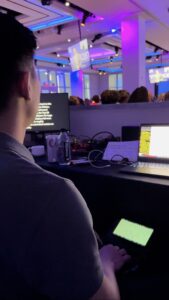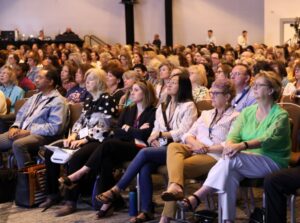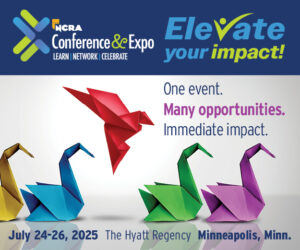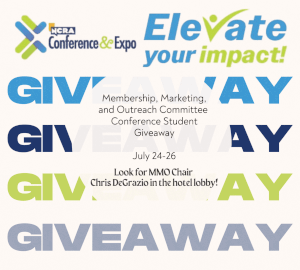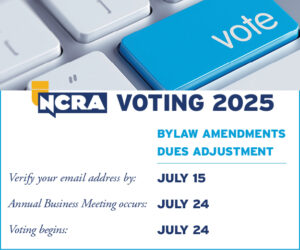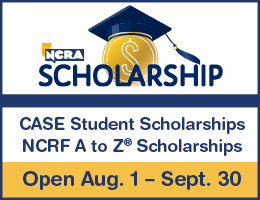High security, audio glitches, and sometimes difficult accents didn’t hinder the NCRA members who had the opportunity to caption the events held during Pope Francis’ recent visit to the United States. Each expressed what an honor it was to caption this historic visit.
Whether captioning live or remotely, their efforts ensured that the hundreds of thousands who witnessed the historical visit were able to follow his inspirational words and messages word for word. For a better insight into captioning an event as large as the pope’s visit, the JCR Weekly interviewed a number of the NCRA members who were involved.
Those members included:
- Judy Gage, RDR, CRR, CBC, an official court reporter from Cleveland, Ohio, who also works part time for the National Captioning Institute, who captioned remotely for the pope’s speeches at Madison Square Garden in New York City, the Basilica and the Curran-Fromhold Prison both in Philadelphia, Pa., the Mass at the Festival of Families, and his farewell remarks before leaving for Rome.
- Sharon Kaup, Vienna, Va., who works for NCI, captioned the pope’s speech to the U.S. Congress.
- Stephen H. Clark, CBC, CCP, Washington, D.C., who works for Home Team Captions, LLC, who captioned the pope’s speeches at the U.S. Capitol and on the National Mall.
- Jack Turner, NCI’s administrative supervisor for realtime captioning, Spartanburg, S.C., who captioned the pope’s visit to Our Lady, Queen of Angels School in Harlem, N.Y., and the Mass held at the Saints Peter and Paul Basilica in Philadelphia, Pa.
- Vana Ouzts, RMR, CRR, Greer, S.C., was one of the first captioners to cover the pope’s speeches.
- Paula K. Arispe, RPR, Mansfield, Texas, who captioned for NCI.
- Terralyn Joy Gentry-Roberts, a freelance reporter for Collins Realtime Reporting in Dallas, Texas, who captioned for NCI.
How did you prep for captioning the pope’s speeches?
Gage: Luckily, we were provided with his remarks in advance so we could prescript them. At all of my events, the pope mainly spoke in Spanish and his remarks came through an interpreter. I went through all the scripts and made sure I had all the words in my dictionary in case he went off the script. I remember adding one word in particular, “parrhesia,” which he ended up saying more than once.
Clark: I received the names of those expected to speak but did not receive any of the prepared remarks. I watched the pope’s speech at the White House the day before in order to familiarize myself with his English speech patterns.
Turner: In terms of preparation, I was provided with scripts that would be spoken by Pope Francis. Next, I googled on the Internet and read all that I could find that was posted regarding both events. For the Mass on Friday, I reviewed the formal procedures of a Catholic Mass.
Arispe: I couldn’t really prep entirely for the pope’s speech. Since I knew he would talk about our world status, I had to make sure that I had common spellings in and proper IDs.
Ouzts: I was the first captioner in the pope coverage, so I faced the tweaks and kinks first, such as running audio and encoder tests days before, making sure we were in the correct line length for what the client requested. The client was very good about sending a script. It was officially stamped “Holy See Press Office.” Now you know you are big time!
Did prep and setup take longer than usual?
Gage: The prep for me was a little more than usual. I had to cover two Masses and needed to script all the scripture readings, plus all the different parts of the Mass. I am Catholic, so the Mass is very familiar to me. I have captioned Masses before, so that part of it was all very familiar.
Clark: Yes, setup took longer due to the level of security in order to get into the Capitol.
Arispe: Prep did not take longer than usual. I was captioning along with my co-worker, Sharon Kaup, during his speech, and I was able to find his speech online about 15 minutes in and was able to create a file so we could punch back the rest of it.
Were there any factors that made this job more difficult than other captioning assignments?
Gage: For most big assignments it’s the technical aspects that make it difficult, not the captioning itself. Fortunately, there were no major problems, thanks to the experienced people working on the technical end. I just had to make sure I dialed into the right encoders and audio lines.
Clark: Not knowing what the pope would say, coupled with his accent, made this difficult, more challenging than most.
Ouzts: I captioned the pope’s appearance at St. Patrick’s in Washington, D.C. We ran into a little trouble with the audio, when it came time for the pope to speak, I only was hearing Spanish in my ear. I had to quickly call the MC to please send me English. He sounded a little disappointed I wasn’t bilingual. They quickly rushed on their end to get the translator in the correct audio line. At the United Nations, the news broke that Speaker John Boehner was stepping down and took the pope coverage off the channel I was watching. I referred quickly to my backup, searching for someplace to watch. I hate writing blind and not seeing what I’m captioning.
Did his accent, or any translators’ accents, make it difficult to caption his words?
Gage: The pope’s accent was very difficult, but like most accents, after you listen for a while, you start to pick him up.
Clark: Yes. When I heard a word that I was unsure of, I found the best way to figure it out was to repeat the word out loud. Just feeling the word as I said it helped me to better understand and then write what I heard.
Kaup: His accent did make things difficult. Though shortly after the speech started, my co-captioner on the house at the time was able to find his speech and we were able to punch back and alter where necessary.
Turner: The only item that made it more difficult than most other assignments was the difficulties of understanding Pope Francis speak, even with a script. He would occasionally go off script, and it was difficult. It was his accent coupled with the softness of his voice. I listened to his address to Congress the day before and it helped somewhat. If we can understand when one goes off script, it is not a problem because we can usually respond to that. You can only focus carefully and try to figure out what is being said in the context of the subject.
Arispe: This job was difficult because of the pope’s accent. I had to listen more carefully and wait a few words to figure out what was being said.
Ouzts: At the United Nations, he stopped before facing the main assembly and thanked all of the personnel involved in making it all happen. He spoke very slowly with his accent, and I had to pause a few times and let a couple of words pass before I went, Oh, that is what he said. I covered the Ground Zero speech, also, which was very moving. Several religions were represented and the pope spoke in English for a little bit, no speech in front of me, but having heard him before, he was a little easier to understand.
Did you need to prep any different given that he would have an accent?
Gage: No, you don’t prep any differently. You just listen harder.
How did you handle the pope going off script during his speeches?
Gage: The pope constantly went off his script. In fact, I could not even send the prescripts I had. I had to caption them. The pope would speak in Spanish and he had a translator speaking English into our microphones as he spoke. (I am used to hearing that because of all the interpreted work we have at our courthouse.) Fortunately, it was all done at a very moderate pace and not a problem. You just have to always be paying attention and listening. When someone goes off script, you just hop in and write. It’s really not a big problem, at least for me.
Kaup: Sometimes the pronunciation of a word you know is not quite what you might think it was and could take a while to figure out through the context of the speech. If they’ve gone off script, I keep writing until I am able to find where they’ve picked up again during any pauses or applause and continue from there.
Gentry-Roberts: The first speech at Independence Mall [in Philadelphia] had a translator and he pretty much stayed on script but added a couple of paragraphs and sentences. The second event was the Festival of Families hosted by Mark Wahlberg. This was much more challenging with all the various families coming up to speak, each with different accents. When it was time for the pope to speak, I thought it would be a piece of cake like the first time because I had the script. He started speaking through the translator again but I quickly realized what he was saying was not on the script I had printed out! I became a little frantic for a few moments wondering if I had overlooked it in what was sent to me ahead of time. I told myself to just calm down, focus harder, and tune into the translator. I remember scooting up to the edge of my seat and straightening up my posture to help with focusing. The audio provided a bit of an extra challenge because they had the pope and the translator talking at the same time, and they were both the same loudness.
Would you consider this job a highlight in your career?
Gage: It was an honor to participate in sending the pope’s message to all who came to experience him, and I was also grateful that NCI had the confidence in me to give me this assignment.
Clark: This is definitely one of the most important and high-profile events of my career. It was truly an honor!
Kaup: It certainly would be a highlight from the standpoint it was the first time a pope addressed Congress, and I had the privilege of being one of the captioners assigned during the time period he was speaking. He gave a very heartfelt speech, very soft-spoken man, and I was moved by the thoughtfulness that went into it.
Turner: I have captioned some very interesting programs/subjects, but this is obviously a highlight because of the historical significance of the pope’s visit. It was very rewarding.
Arispe: I would consider this one of the highlights of my career. I have had to cover other Joint Sessions of Congress with other leaders of the world, but this is the first pope that has ever spoken to Congress. It was an honor and privilege to be part of history. He is such an inspiration to people from all faiths.
Ouzts: Not everyone gets to caption for the pope. I was happy to be a part of the team writing history.
Gentry-Roberts: I received the availability request via email and was excited at the potential opportunity to be part of such an important event in history. I felt very honored to be able to caption two events on Saturday. I would definitely consider this a highlight in my career.

